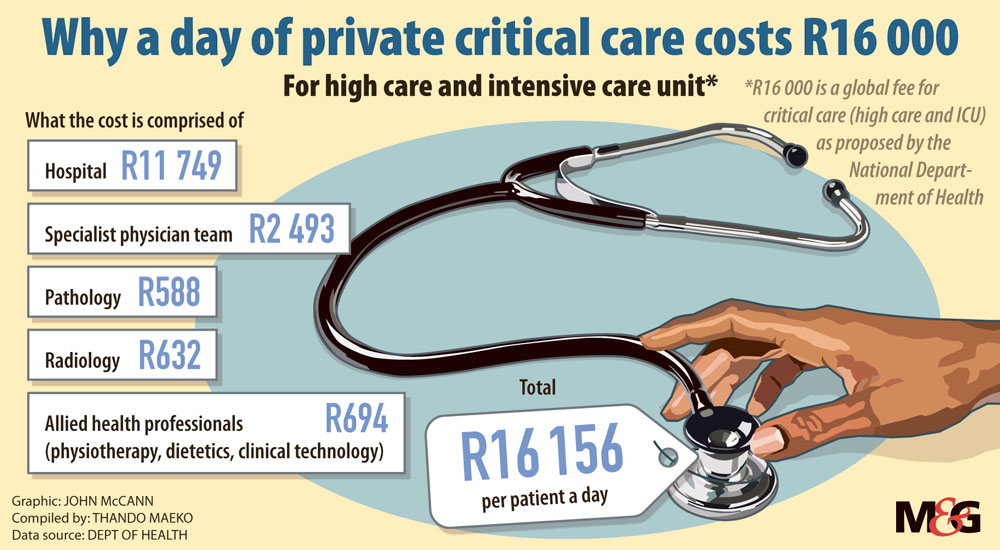(Graphic by John McCann)
South Africa’s three largest private hospital groups, Netcare, Mediclinic and Life Healthcare, are in discussions with provincial health departments to allow public Covid-19 patients to be treated at private facilities.
This is ahead of the anticipated spike in Covid-19 infections and the possible scenario where the country’s public health facilities run out of adequate hospital beds and staff.
The national department of health has already agreed to pay private hospitals R16000 a day for a Covid-19 patient. The cost includes the use of the bed, staff salaries and compensation for a team of specialists, radiologists, pathologists and other health workers.
The hospital groups have agreed to treat the patients “on a cost recovery basis and not make a profit on these patients”, says Life Healthcare group chief executive Adam Pyle.
Although the national health department has set the price for treating critical Covid-19 patients in private facilities, agreements between private hospitals and provincial health departments have not yet been concluded.

Netcare’s director for strategy and health policy, Melanie da Costa, said that negotiations with Gauteng and the Western Cape are at an advanced stage while discussions with other provinces are ongoing.
Although the collaboration between the private and public healthcare sector is a silver lining in the battle against the disease, private hospital groups are concerned about further financial pressures on them.
Pyle says that although the Life Healthcare group is committed to working with the government to curb the spread of Covid-19 and to treat infected patients, the company is concerned about the sustainability of the tariffs that have been set.
Hospital groups have experienced significant revenue losses as a result of the lockdown, because under the regulations some procedures were classified as non-essential and were cancelled.
Life Healthcare has already suffered a R240-million knock in revenue as a result of the pandemic and Pyle says the company “anticipates tough trading conditions to persist for at least the next six months as it continues to feel the impact of the Covid-19 pandemic”.
Covid-19 has resulted in the company bearing the costs of testing and screening employees, patients and doctors.
Pyle says the company also had to restructure its hospitals to ensure the Covid-19 health and safety guidelines are adhered to for all patients.
Mediclinic’s chief clinical officer for Southern Africa, Dr Stefan Smuts, says patient admissions have declined since South Africa entered into lockdown.
The company has had to pause capital investment projects “to allow for a better cash position”.
The first Covid-19 case was reported on March 5 and on March 15 President Cyril Ramaphosa declared a national state of disaster and announced measures to contain the spread of the disease. Patient occupancy rates decreased by 32.5% when the country entered the hard lockdown on March 27.
For the year ending March 31 Netcare had lost R143-million in revenue as a result of the pandemic.
Victor Mapunga, a research analyst at Old Mutual Wealth Private Client Securities, said in a note that the outbreak of Covid-19 and the subsequent lockdown will have a “material impact” on private hospitals’ near term earnings. Mapunga said Netcare stands to lose the most revenue out of the three private hospital groups “because all its operations are in South Africa, although it has a stronger balance sheet and liquidity position”.
“Life Healthcare’s UK operations and Mediclinic’s Swiss hospitals have supported their rand-based earnings because of the weaker currency,” Mapunga said, adding that “Both companies are also expected to benefit from state outsourcing of critical care to treat Covid-19 patients.”
According to the latest data from the Trade & Industrial Policy Strategies (Tips), South Africa is able to add more hospital beds and equipment as the number of Covid-19 cases increases, but the country could struggle to find enough staff for the anticipated spike in positive cases. This, said Tips, paves a way for a future of greater collaboration between private and public healthcare sectors.
If the relationship between the public and private healthcare sectors improves as a result of the pandemic, “it should bridge the trust deficit that previously characterised relations … Hospital groups could certainly benefit from greater government collaboration and understanding in a sector that is presently facing a myriad challenges.”
Thando Maeko is an Adamela Trust business reporter at the M&G